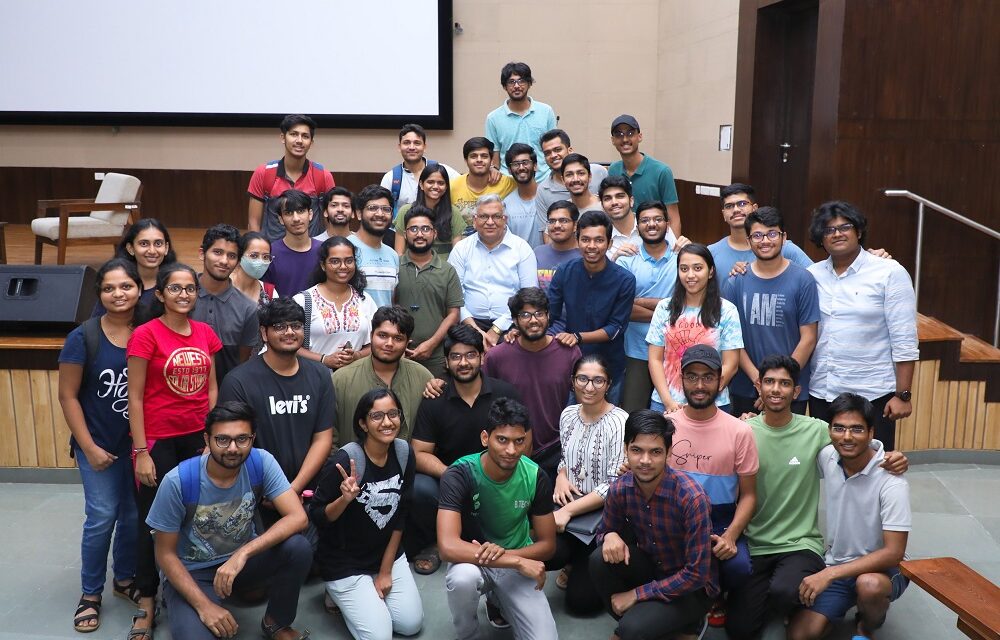STORY CREDITS
Writer/Editor: Apeksha Srivastava
Photo: Media and Communication, IIT Gandhinagar
“Our greatest glory is not in never falling but in rising every time we fall.” — Confucius, renowned philosopher
This is the mantra that Prof. Sudhir K. Jain always promotes. According to him, it is not just about rising after every fall but also about learning from those falls. His interactions with the students of the Indian Institute of Technology Gandhinagar (IITGN) have always been memorable. It is always the same feeling — he enters the auditorium packed with students, asks how we are doing, one conversation leads to another, and, as the current IITGN General Secretary Nikharv Shah puts it, we get glued to our seats for the next 60–70 minutes!
Prof. Jain, the founding Director of IITGN and the current Vice-Chancellor of Banaras Hindu University, has inspired many students. On 24th September 2022, we got an opportunity to be a part of an interactive session with him. He gave us some glimpses of his early days at IITGN and how our institute got shaped into what it is today. I laughed and felt nostalgic with everyone in the auditorium as he recounted his experiences. The remaining paragraphs of this piece are my small attempt to capture some tidbits of this dynamic conversation.
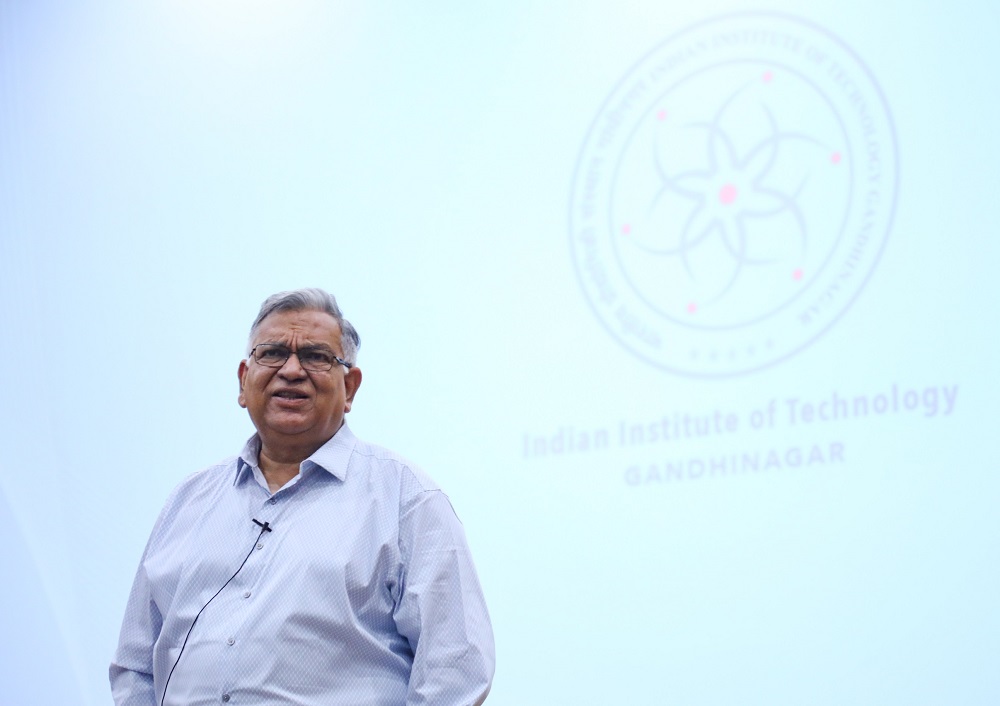
The Vision
In response to a question by one student regarding his vision about IITGN, Prof. Jain said, “If you are clear about the purpose, then everything starts to fall in place. A lot of times, we don’t have the big picture. We don’t know where we want to go or what we want to do. If we achieve that level of clarity, half our work is done. The way I saw IITGN in 2009 and the way I see it today — the big picture has not changed, only the details have changed.” He explained the big picture. Indians are smart. Our forefathers, about 5000 years ago, were very advanced. To continue this tradition, it is essential to provide the present generations with tools of success that they deserve and are capable of having — good colleges. Such tools can equip students to tackle crucial issues like poverty, hunger, and access to healthcare and jobs, making India and the world a much better place.
When Prof. Jain started in 2009, his thought process was straightforward: IITGN should try to build itself into an institution that India ‘should’ have. He continued, “Whenever a baby is born, what are the family’s expectations? Their child should grow up mentally and physically healthy, learn good values so that they can contribute to the family, and do well professionally and personally. Everyone desires the holistic development of their children.”
There were 90 students at IITGN when Prof. Jain first visited the place. He wanted to be their friend and ally — someone with whom they could share their honest views about the institute. He explored their expectations with the mission to create a community where students will learn and grow not only professionally but also personally, where they will become responsible, where they are successful, and where they become good, trusted, and respected citizens. “Do you see now how it ties up with the expectations that a family has for its baby?” he added while taking our conversation further. Prof. Jain believes in creating a place where the students have good personal and professional skills. To achieve that, the first and foremost important thing was to create a culture where students learn to solve their problems as well as those of society, where they help India come out stronger.
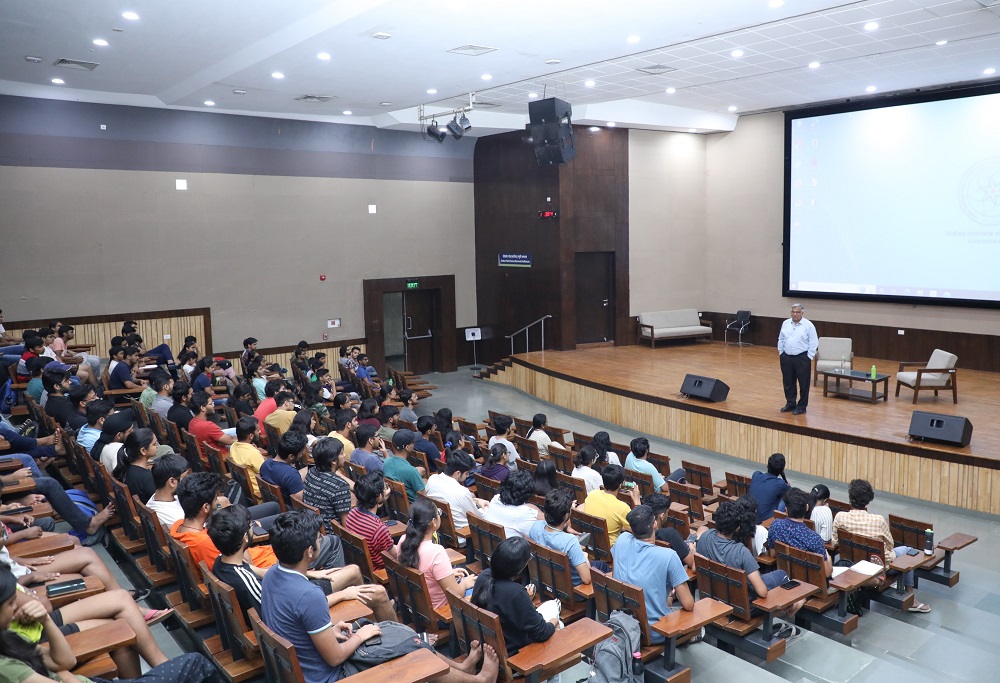
The Values
Giving us an example, Prof. Jain elaborated, “Suppose I violate the traffic rules while driving my car, and the police person lets me go without any challan or fine, I am very likely to do it again because I may not have learned my lesson. I got away by just saying sorry, and I expect to get away again by saying sorry if caught again. This is not effective.”
So, IITGN started with a really basic consensus and understanding that certain types of conduct are not acceptable in society — this was true for all students, faculty, and staff. It goes without saying that if one wants to prepare students for the future, then one needs to emphasize that there are certain red lines (like thievery, violence, and harassment) that no civilized society will allow crossing.
A very simple rule emerges — things that no civilized society will accept are strictly not accepted at IITGN, on both personal and professional fronts. However, for things on which civilized societies have differences of opinion, IITGN lets its responsible individuals decide the course of action they want to take. Prof. Jain asked us, “Do we want our students to emerge as responsible adults? If that is so, then we have to give them opportunities to make decisions and make mistakes. How many of you know how to ride a bicycle? Did you ride it perfectly on your first attempt? Is there anybody in this room who did not fall when learning how to ride a bicycle?” We responded with a “No!” in unison. He continued, “So while learning cycling, you made mistakes. Then, how about life? How about making friends? How about choosing the courses you want to study? How about deciding whether to go to a movie or study?” We all laughed. All of us relate very well to these dilemmas we often face.
One of the basic philosophies of IITGN is to let students make decisions as responsible people. These decisions may sometimes lead them to success and other times to failure. The latter is when they realize that they made a mistake. Such mistakes are pathways to learning. Eventually, the students learn how to make better decisions based on their experiences and support from their parents and teachers.
A Student-Centric Approach
According to Prof. Jain, IITGN’s first objective was to create a student-centric approach where students are treated with dignity, given empowerment, made responsible for their actions, and provided a comfortable environment where they can thrive. For instance, all students need to regularly balance their physical fitness courses with academic lectures. Their views are an indispensable component in making important decisions about the institution.
Recounting another experience, Prof. Jain said that when he was interviewed for this job at IITGN, he emphasized that he will do anything and everything to make sure that there is no compromise on the quality of faculty in the recruitment.
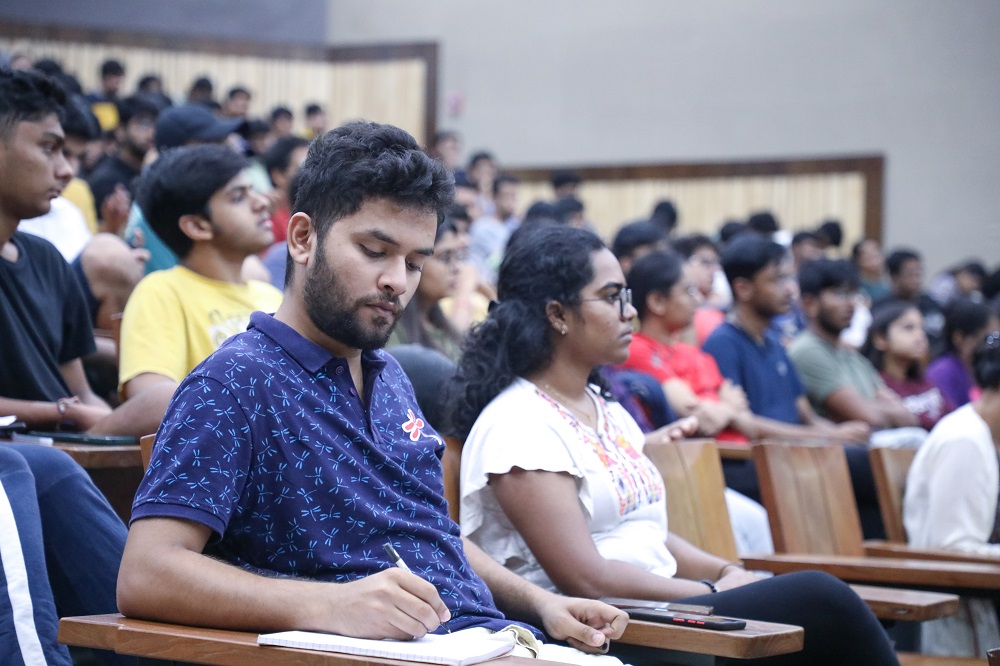
Recruitment of quality faculty (and staff) has been a very fundamental focus at IITGN. The institution prides itself on having teachers who are not only outstanding in academics but also honorable people, good citizens, and exceptional role models for the students. In the words of Prof. Jain, “Personal interests are never above institutional and community interests. Healthy competition, right guidance, and good teamwork possess the capacity to propel many people to develop into better versions of themselves. This is how IITGN eventually developed a team of quality faculty that you students see today. Shaping this IIT into an institution that India ‘should’ have will require IITGN to continue to take tough decisions. The Insitute should not compromise on its values and authenticity in the years ahead.”
Such thinking helped in establishing an alignment in and among the goals of students, teachers, and staff. IITGN is open to constructive criticism and strives to refine itself based on such views. It eventually opens doors to good people becoming part of the family, who create a thriving atmosphere for everyone, which in turn lays the groundwork for focussing on creating different cutting-edge programs for students. IITGN is a ‘students first’ institute — apart from the conventional national and international academic, research, and industry collaborations, it has writing courses that prepare the students to express themselves, the Foundation Program, the Explorer Fellowship, Invention Factory@IITGN, and many more initiatives. IITGN has succeeded in establishing an environment where students can freely discuss their concerns and find solutions through a collaborative process. In addition to engineering, sciences, and humanities, its objective is to equip students with skills that will help them succeed in their personal and professional life.
The Foundation Program is targeted at the holistic development of students, including themes of creativity, values, ethics, teamwork, physical fitness, and social awareness. The Explorer Fellowship, a unique annual summer program, involves IITGN students traveling on an extremely low budget for six weeks across India during summer to get them introduced to diverse cultures, lifestyles, people, and places of India. They learn the importance of societal connections. IITGN has prepared its students well enough to have the confidence to undertake and learn from such adventures. Invent@IITGN is a six-week summer initiative in which students from IITs across the country work in teams of two and ‘prototype, pitch, and patent inventions’ that they have conceived during this program.
Prof. Jain elaborated that IITGN was the only IIT that allowed the students on campus to stay back if they wished when the Covid pandemic hit India. They were never asked to vacate the hostels, and around 40% of them stayed in the hostel during the peak of the Covid waves. This was possible due to the extraordinary maturity and responsibility that IITGN students acquire. The students, faculty, and staff came together so that things could run smoothly on campus during lockdowns.
The Final ‘Mantras’
Emphasizing the importance of fairness and consistency, Prof. Jain remarked, “They are keys to success. Consistency needs to be in time and space. You cannot be tough this year and lenient the next year. People are respectful of the system if it is fair and consistent.” He added, “You need to decide your priorities and gather good people around you. I would also like to say that the passionate commitment of the people that I surrounded myself and worked with here is commendable and inspiring. We need to sincerely, fairly, and consistently do our bit, and recognition and appreciation may follow.”
Students need to develop problem-solving skills as well as an understanding of how to use them in different situations and in which forms. It is crucial to have the right attitude, values, ethics, and life skills. IITGN’s entire ecosystem and curriculum are with the mindset to prepare students for life. The backbone of this institution is its collaboration — the teamwork between students, faculty, and staff. “We need to lead by example and build and maintain trust in each other,” concluded Prof. Jain.
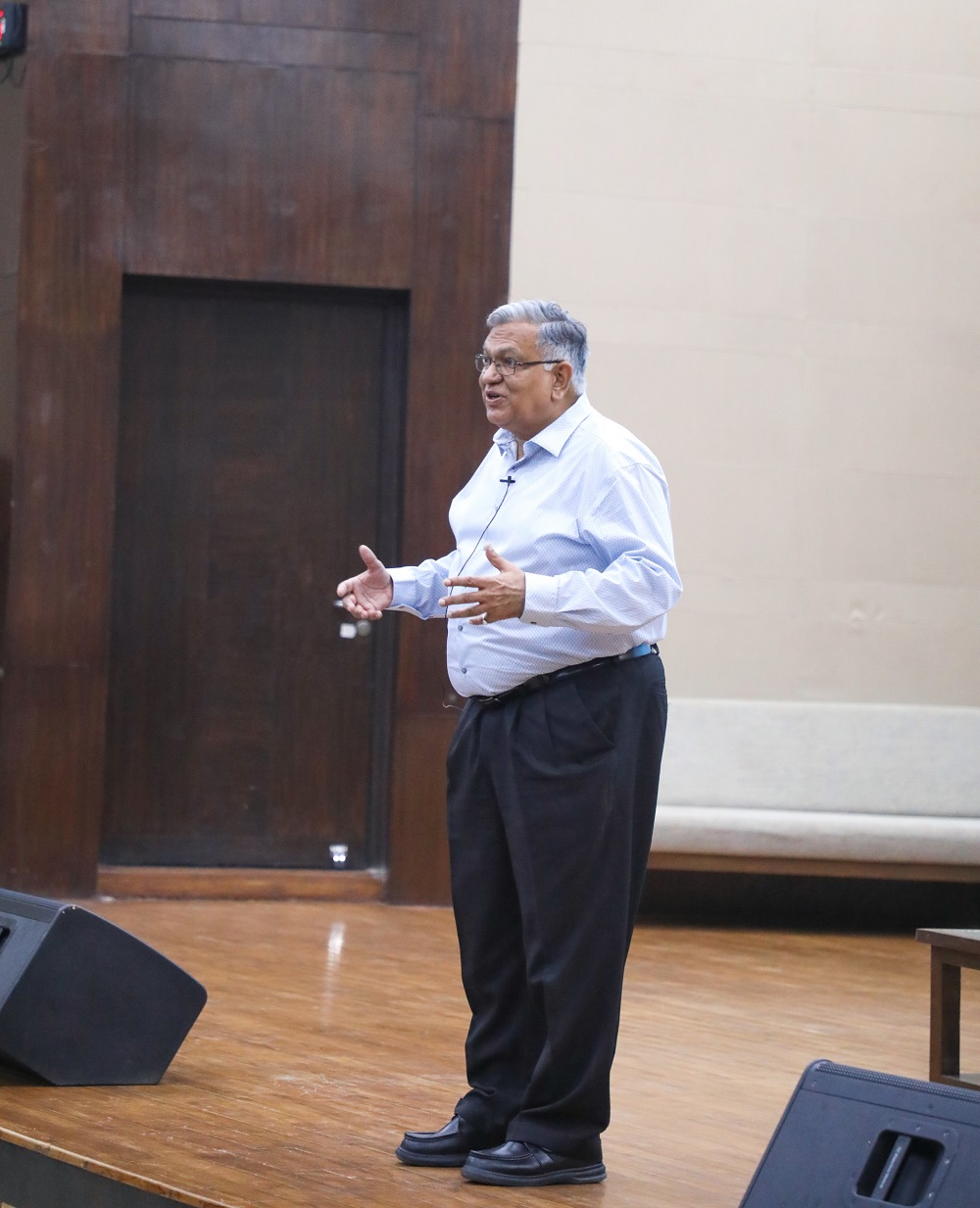
During this lively interaction, many of us students took a small step in the direction of learning some nuances of creating and sustaining a good team focused on a goal and constantly trying our best to achieve that goal. Often, it may involve taking tough decisions. We need to explore the world outside our comfort zones, step up, and take responsibility. Things will not always go as planned in life. We should have the skills and confidence to develop alternative strategies with the limited resources we have to tackle such situations. As Prof. Jain said, the details can change with time, but the big picture would normally remain the same till we achieve the goal we set in the beginning! Amidst the environment where we have the freedom to experiment, make mistakes, learn and grow, we also learned from him that a sincere sense of inclusivity and ownership for our institution is another crucial piece to completing the puzzle of success.
In Prof. Jain, many students find a friend, teacher, and mentor they look up to. He is someone who recognizes that each of us has a different capability and has provided many of us a place where we can hone and utilize it further. His constant enthusiasm and motivation encourage us to push our boundaries every day.
“You can do anything if you have the enthusiasm. Enthusiasm is the yeast that makes your hopes rise to the stars. With it, there is accomplishment. Without it, there are only alibis.” — Henry Ford, founder of the Ford Motor Company
Thank you, Sir, for always being there for us!
Written By: Apeksha Srivastava, PhD scholar, IIT Gandhinagar. This story has also been published on Medium.

